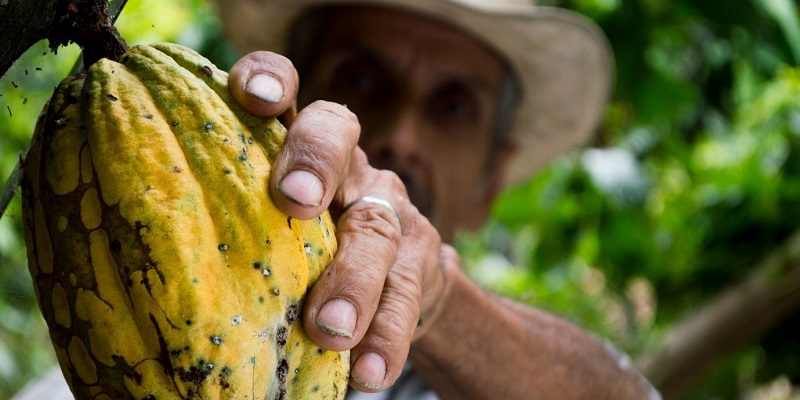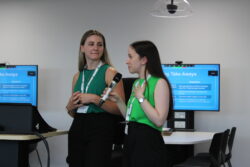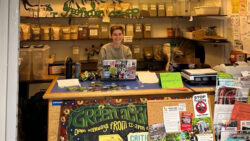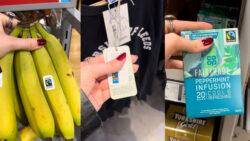What do students at the University of Leeds think about fair trade?

There is much to be done to target injustices within trade. This means ensuring workers’ rights and working conditions are protected, that workers and farmers are paid a fair price for their work, and that communities are supported to develop sustainably... this is where fair trade comes in!
Students are often very engaged with campaigning, but what do students think about fair trade? Sustainability Service intern, Emma Green, delves into students’ thoughts on fair trade by looking into the Student Fairtrade Survey conducted at the University of Leeds in April 2023. Here are six key findings from the survey...

Emma Green talking at the Fair Trade International Symposium in June 2023
What do students think about Fair trade?
- Students are highly concerned about various global issues including those connected to fair trade, but many students aren’t taking action despite claiming they would be willing to.
So, how could you take action on fair trade? These don’t have to be huge commitments, so here are 3 things you could start with.
Buy products with ethical credentials:
- Fairtrade products are widely available in local supermarkets, especially for products such as fruit and veg, tea and coffee, nuts and grains, and chocolate!
- Check online to see where you can buy Fairtrade products.
- Using websites such as Ethical Consumer to inform purchasing decisions, such as using their Ethical Shopping Guide.
Create or sign online petitions campaigning for a fairer future:
- The Fairtrade Foundation currently have a Community Declaration for Climate Justice, demanding fairer funding for the communities living with the worst effects of the climate crisis, often impacting Fairtrade farmers.
- Keep an eye out on websites such as change.org and petition.parliament.uk for petitions.
Join a campaign group or society:
- Leeds University Union has many societies open to join that campaign for positive change, including Green Action which specifically takes practical action on environmental, social, and political issues. They run the Green Action Food Co-op which exists to provide cost-price ethical food and low-waste essentials.
- The LeedsforChange website has 187 different groups to get involved with outside of University societies too, aiming to create positive change in our society.
For more opportunities to get involved with the Fair Trade movement, you could also sign up to the Fairtrade Foundation’s email updates.

Where can you access Fairtrade items on campus?
- Buying ethically does matter to students, with motivations often being about doing the right thing and avoiding negative impacts of actions where possible.
So where can you buy ethically sourced products on campus?
On campus, you can find an array of Fairtrade and ethically sourced products, both at Great Food at Leeds outlets, and within LUU at the Co-op, LUU Green Action Food Co-op, Common Ground, and even Gear offering Fairtrade clothing!

What does Fairtrade actually mean?
- A lot of students have an understanding of Fairtrade, but this is often narrowly based around farmers being paid a good price and being treated fairly.
Fairtrade (1 word) refers to the certification and labelling system governed by Fairtrade International. Protection of workers’ rights and payment of the Fairtrade Minimum Price are absolutely integral to the work of Fairtrade, but on top of this Fairtrade supports farmers and workers to improve their communities through the Fairtrade Premium.
On top of the price farmers and workers receive for their produce or labour, they receive an extra sum of money to invest in improving the quality of their lives. Communities can use this money as they see fit to improve their social, economic and environmental conditions, allowing investment in areas such as better housing, education grants, farm improvements, clean water supply, and improving healthcare.
Fairtrade and the wider Fair Trade movement more broadly works towards achieving trade justice and sustainable consumption and production worldwide.
Is the University of Leeds a Fairtrade University?
- 92% of students think it is important for the University to take action to use and promote Fairtrade.
The University of Leeds is actually a Fairtrade University, and has been since 2005. The Fairtrade University and College Award acknowledges institutions that have embedded ethical and sustainable practices through their curriculum, procurement, research and campaigns. The University’s Fairtrade Policy sets out the University’s commitment to supporting and promoting Fairtrade, with regular meetings of the cross-University Fairtrade Steering Group to ensure this work continues.

What are the barriers to buying Fairtrade items?
- There are various barriers to students purchasing ethically sourced products, including information about ethics being difficult to find, unreliable or badly advertised, as well as typically higher prices.
An easy way to identify ethically sourced products while shopping is to look for the FAIRTRADE Mark. Only products that are certified in accordance with the stringent Fairtrade social, economic, and environmental standards carry this mark. The FAIRTRADE Mark is widely regarded as the most recognised ethical label, with 93% of UK shoppers claiming to recognise the label, with 83% trusting it to decide whether a product is ethical.
Shopping ethically does not have to be expensive either, with more supermarket retailers now offering Fairtrade products as part of their value ranges such as:
- Co-op’s Honest Value range that is ‘fair on your pocket and the planet and fair for producers’.
- The M&S Remarksable Value range that is ‘great for your wallet, and a guaranteed fair price for farmers – it’s a win win’.
Although some big-name branded ethical products may be expensive, there’s still plenty of options to shop ethically and affordably by looking at own-brand products and shopping second-hand.

Embedding sustainability in learning
- Few students felt they had learnt about fair trade during their time at University so far, but would be keen to learn more about fair trade and sustainability more broadly.
It’s always great to hear that students would like to learn more about sustainability, and that is exactly what the University of Leeds’ Sustainable Curriculum programme is working towards. As part of the University’s Climate Plan, one of the seven core principles is to ensure that all students have the opportunity to learn about and engage with sustainability during their time at the University of Leeds, whatever your programme or level of study.
In addition to course material, there are growing numbers of opportunities for students to engage with sustainability during their time at University. You can choose from a list of sustainable research project ideas for your dissertation, participate in our annual Student Sustainability Research Conference, apply to be a Student Sustainability Architect as a part-time paid role, as well as having the chance to participate in a whole host of volunteering opportunities through the year.

 We use the United Nations Sustainable Development Goals (SDGs) as a framework to guide our activity.
We use the United Nations Sustainable Development Goals (SDGs) as a framework to guide our activity.
Find out more about our impact on the SDGs.
